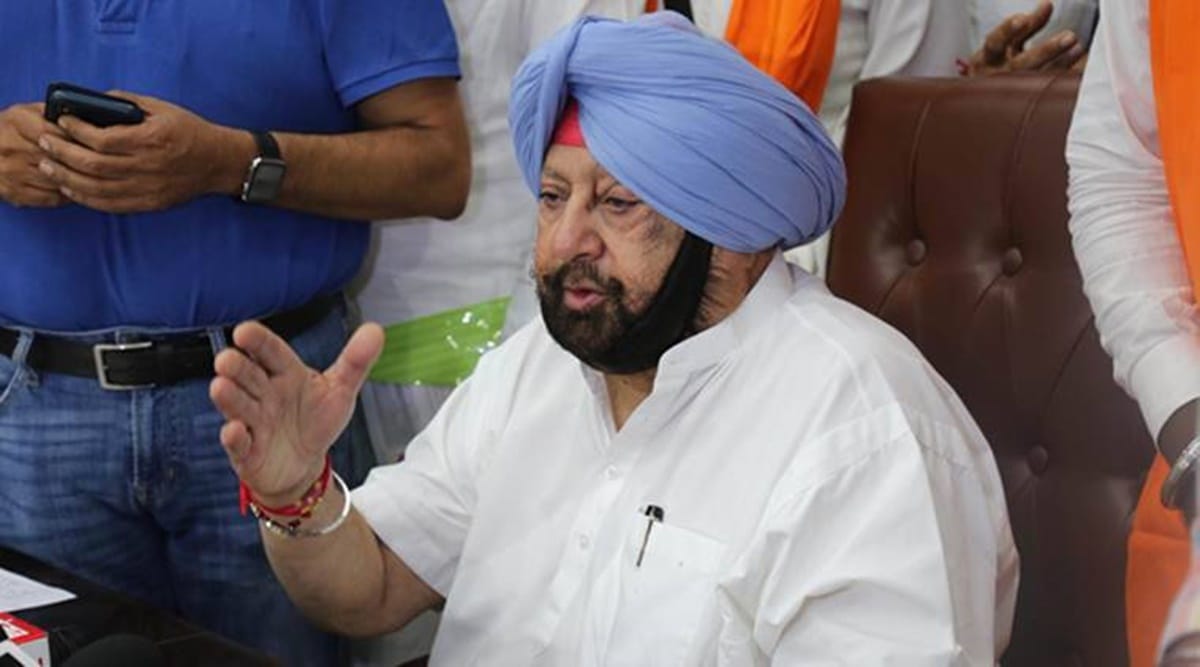 Amarinder also said that with a four-year stint, a soldier would barely have enough time to gather basic experience of soldiering before he would be out in the street. (File)
Amarinder also said that with a four-year stint, a soldier would barely have enough time to gather basic experience of soldiering before he would be out in the street. (File)Expressing serious reservations at the new method of recruitment of soldiers unveiled Tuesday, named Agnipath, former Punjab Chief Minister Capt Amarinder Singh joined the large number of veterans in questioning the logic of doing away with a “perfectly good working system” in existence.
The former chief minister, who has served in the Sikh Regiment and whose family has an association with the Regiment, also slammed the move to recruit soldiers under All India All Class method of recruitment, saying this will sound the death knell of single class Regiments like Sikh Regiment, Sikh Light Infantry, Gorkha Rifles, Rajput Regiment, Jat Regiment, etc.
“What is the rationale to do so, I do not understand,” said Amarinder speaking on phone to indianexpress.com from London. He added that the All India All Class experiment with single class regiments had been introduced in the ’80s and had failed. “These regiments have been performing well in their present character, so why change it? I do not agree at all with this move. These regiments have their own traditions and way of living and how do you expect a person who is not from that background to understand that,” he asked.
Amarinder also said that with a four-year stint, a soldier would barely have enough time to gather basic experience of soldiering before he would be out in the street. “There used to be a seven-year service period and a reserve liability of seven years. But four years is too less a time for a soldier to be effective at the cutting edge,” he said.
Best of Express Premium
Reacting to the development, Lt Gen Tej Sapru (retd), former GOC-in-C Western Command, said that the new move would not be of benefit to India-Nepal relations. “The Indian Army soldiers of Nepalese domicile are a major function of Nepalese economy by way of their pay and pension. They are also vital ambassadors of India down in the villages where they live. This is one reason why the Chinese have not been able to make much inroads into the Nepalese society. To cut down their intake by all class recruitment and then by reducing the years of service, a major change in Nepal-India relations could occur,” he said.
A former Director General Artillery, Lt Gen PR Shankar (retd), has been scathing in his criticism of Agnipath, terming it as a ‘Kindergarten Army’. Writing in his blog, Gunner’s Shot, Lt Gen Shankar wrote, “The annual intake into the Army is approximately 65 thousand soldiers per year, give or take 10 percent. It will increase to 1-1.5 lakhs per year as per this model. This will result in skewed intake and recruitment model. Why? We do not have adequate numbers even in the current conditions from many parts of the country.”
Many veterans took to social media to point out ‘flaws’ in Agnipath and made suggestions. Maj Gen BS Dhanoa (retd) tweeted, “Two serious recommendations to the just announced recruitment policy for the armed forces; a) Increase the service period of new recruits to a min of seven years. b) Make the retention of those keen to serve longer at least 50 percent.”
Reacting to the announcements of skill certificates to be given to those who are released from service after fulfilling their contract, he said, “Too much emphasis on providing skills to youth in the forthcoming armed forces’ HR intake changes. Real skills would be acquired by those who go on to don the uniform a little longer. On one hand the training is for 6 months only, the rest would be taken up in routine deployment.”
Another senior Army officer, Maj Gen Yash Mor, tweeted, “Stop looking at armed forces from economic point of view. Military life and career can’t be evaluated from money saved to the exchequer. Looking to be difficult to implement scheme, with negative connotations in all aspects.”
Lt Col SS Sohi (retd), who has also served in the ranks as a soldier before getting an officer’s commission, said that it takes four years for new recruits to learn the basic ropes of the profession. A former officer in the Bihar Regiment, Lt Col Sohi also criticised the all class system of recruitment envisaged for single class regiments, saying it will finish off the pride and elan of these regiments.
“As for contractual soldiers, we have already seen the poor performance of reservists in our units when they were called up for the 1971 war. My own experience was that they were shy of taking risks because they knew they had been called up for service for only a short period of time. The same is likely to be repeated in Agnipath where these soldiers on four years’ contract may be averse to risk or bodily harm in line of duty,” he said.
- The Indian Express website has been rated GREEN for its credibility and trustworthiness by Newsguard, a global service that rates news sources for their journalistic standards.

